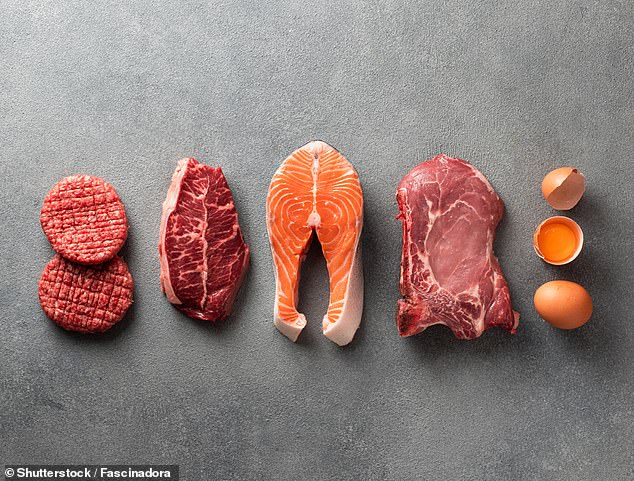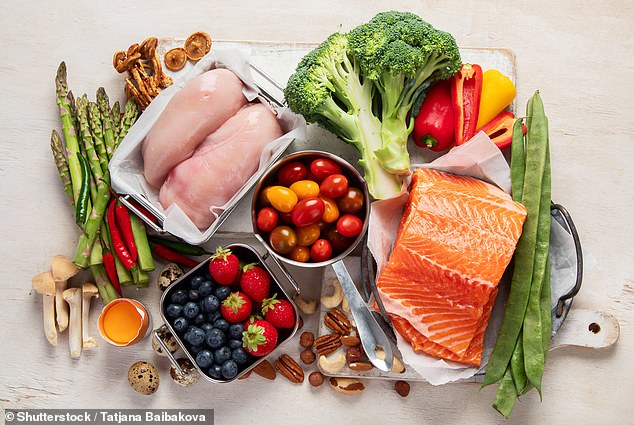We’re constantly told to eat more protein, with many people — especially men — eating it at the exclusion of almost all other macronutrients, but experts warn that this advice is not only misleading, but potentially harmful.
It’s thought that around half of adults upped their protein intake in 2024, with the number of supermarket products with ‘added’ protein surging in recent years.
Furthermore, the global protein bar market is predicted to swell to a whopping £5.6billion by 2029, according to Fortune Business Insights.
At the same time, social media is awash with influencers from Joe Rogan to Bear Grylls advising viewers on how to boost their protein intake — with everyone from menopausal women, who are prone to muscle loss, to fitness enthusiasts targeted.
But according to Rob Hobson, a registered nutritionist and author of Unprocess Your Life, protein doesn’t work in isolation: carbohydrates and fats are just as important.
‘Whilst protein is essential for health, strength and maintaining muscles as we age, the reality is that most people in the UK are already getting more than enough’ he says.
‘On average, adults in the UK consume around 1.2g of protein per kilogram of bodyweight a day, which is already above government guidelines of 0.75g/kg/day,’ he added.
This means men should typically be consuming around 60g of protein a day and women around 54g, whilst anyone over the age of 50 should be aiming for closer to 1g per kilogram — because absorption decreases with age.

Hobson added that there is also a tendency to associate high protein labels with health, but often these products are ultra-processed, high in salt and sugar and additives. Rather than focusing on the number of the scales, opt for nutrient-dense sources of whole protein

According to Rob Hobson, a registered nutritionist and author of Unprocessed Your Life, it’s not so much about eating more protein, but opting for better sources
Too much of a good thing: the risks of eating too much protein
Protein is one of three essential macronutrients, along with carbohydrates and fats, that we need for growth, development and repair.
It’s found throughout the body as building block of every human cell—in muscle, bone, tissue, skin, hair and virtually every other tissue.
It makes up the enzymes which power biochemical reactions and is vital for the formation of hemoglobin which carries oxygenated blood around the body.
And whilst consuming enough is essential to stave off malnutrition, and preserve muscle mass and strength as we age, consuming too much could lead to a number of serious health complications including kidney stones, heart disease and even cancer.
‘The problem is that online messaging often takes these upper figures meant for small, specific groups and applies them universally.
‘But for the average person, there’s no evidence that going far beyond your individual needs provides extra health benefits and if anything, it may come at the expense of other key nutrients like fibre, vitamins and minerals,’ Hobson said.
Kidney failure
When protein is consumed, it’s broken down into amino acids which are then used for tissue growth and recovery.
This process produces waste products such as urea calcium which are then filtered out of the body by the kidneys. But having too much protein can place unnecessary strain on the kidneys, resulting in kidney stones and even early stage kidney failure.

UK guidelines recommend adults consume about 0.75g of protein per kilogram of body weight. For the average 72kg woman, that equates to approximately 54g a day
The menopause
Dr Federica Amati, one of the scientists behind the popular diet app ZOE, previously told the Daily Mail that our protein needs change over time — and it is not always a case of upping our intake to compensate for the changes our bodies go through as we age.
For example, it has long been proved that going through the menopause puts women at higher risk of developing osteoporosis, a condition that weakens bones, and makes it harder to maintain muscle mass.
However, Dr Amati warns: ‘Simply increasing your protein intake won’t address this.’
In fact, research shows that eating a lot of animal protein in midlife could increase the risk of cancer.
A 2014 study from the University of Southern California involving more than 6,000 adults over 50 found that a high-protein diet—where protein accounted for roughly 20 per cent of total calories—was linked to increased risks of cancer, diabetes and mortality.
Cancer risk
In this study, adults with the highest protein intake were four times more likely to die of cancer compared with those on a low-protein diet.
Other research suggests that tumours, including melanoma and breast cancer, may grow faster if a patient is on a high-protein diet.
It is thought this is the result of the overstimulation of a key cellular pathway responsible for growth—given that cancer is the uncontrolled proliferation of cells.
But it’s not only the volume of protein that’s to blame, but the type of protein being consumed.
As Professor Charles Swanton, a leading oncologist and chief clinician at Cancer Research UK, explains: bowel cancer risk is ‘much higher’ if you eat red or processed meats every single day.
An unhealthy obsession with protein powders has also been linked to an increased risk of bowel cancer, as they alter the gut microbiome, triggering inflammation and releasing toxins.

‘Remember, most of us don’t need more protein, we just need better protein with a balanced diet,’ Hobson says
How to get the right balance
Rather than chasing numbers, Hobson advises focusing on a diverse range of good quality protein sources.
He suggested: ‘Include a mix of plant and animal protein sources—such as lentils, eggs, soy, nuts, fish, poultry and dairy—to easily hit your protein goals.’
For example, sprinkling nuts and seeds on your yoghurt in the morning can ensure you’re starting the day with over 10g of protein.
A small chicken breast contains around 30g of protein—making it a great choice for lunch or dinner, he added.
You can also boost your protein intake throughout the day by snacking on nuts, cheese and fruit with nut butter if you’re worried about hitting your goals.
‘Remember, most of us don’t need more protein, we just need better protein with a balanced diet,’ Hobson said.